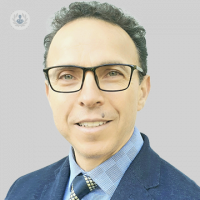Partial knee replacement: everything you need to know
Written by:Several different types of arthritis can affect the knee joint, causing severe pain and dysfunction. This can have a significant impact on your quality of life. One treatment for knee arthritis is a partial knee replacement. In his latest online article, renowned consultant orthopaedic surgeon Mr Nezar Tumia explains this procedure in detail.

What are some of the different types of arthritis that can affect the knee?
Common types of arthritis include osteoarthritis and inflammatory arthritis. The knee joint is normally described as three compartments
- The medial compartment
- The lateral compartment
- The patellofemoral joint
Inflammatory arthritis typically affects all three compartments. However, osteoarthritis can be confined to just one or two of the compartments.
When is a knee replacement necessary to treat arthritis?
Knee replacement is a very good way to treat knee arthritis when conservative treatments are not effective. Total knee replacement is indicated for all cases of inflammatory arthritis and in certain cases of osteoarthritis (if all three compartments are affected). If the osteoarthritis is affecting just one or two compartments, then a partial knee replacement can be very effective at reducing pain and restoring function.
What does a partial knee replacement procedure entail? What are the advantages?
Partial knee replacement is not indicated for inflammatory arthritis. Partial knee replacement involves resurfacing the knee joint’s worn parts, done through minimally-invasive surgery.
The wound of a partial knee replacement is generally about a third of the length of a total knee replacement. This means less bleeding and less soft tissue disruption.
Partial knee replacements usually take a shorter amount of time to perform. This reduces the risk of complications including:
- Infection
- Thrombosis
As it’s a minimally invasive surgery, there is generally less pain after the procedure. It also allows the patient to make a quicker recovery. Partial knee replacement is frequently done as a day-case operation.
Are there different types of partial knee replacement?
There are three types of partial knee replacement:
- Medial compartment knee replacement
- Lateral compartment knee replacement
- Patellofemoral joint knee replacement
The knee joint has to meet certain criteria to be suitable for these different types of knee replacement.
All of these types can be used for any age group, but are generally more beneficial for elderly patients due to quicker recovery time and much less pain.
Nevertheless, all types of knee replacement require an extensive rehabilitation programme following the surgery. This is usually under the guidance of a physiotherapist. Most of the recovery will occur in the first 6 weeks. The patient may need to use walking aids for the first two to four weeks. The patient can return to a low level of activity or a desk-based job 4 to 6 weeks after surgery.
Partial knee replacements tend to restore a large range of movement to the knee joints, with almost full flexion. Patients can return to full activity, including low-impact sports. 90% of patients who undergo a partial knee replacement will have their knee last at least 15 years.
Mr Nezar Tumia is a leading consultant orthopaedic surgeon based in Newcastle upon Tyne. If you would like to book a consultation with Mr Tumia, you can do so via his Top Doctors profile.


